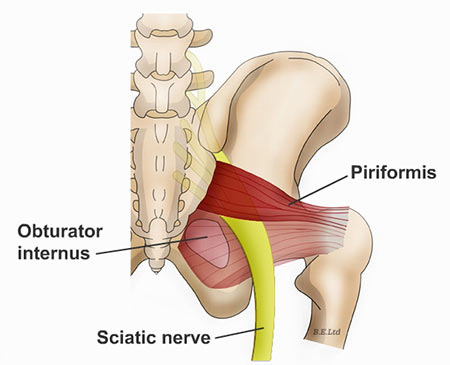 Midtown Manhattan
36 W 44th St Ste 1416 New York, NY 10036
Midtown Manhattan
36 W 44th St Ste 1416 New York, NY 10036
- (212) 621-7746
- text us
- BOOK ONLINE Call for Same Day Appointments
 Midtown Manhattan
36 W 44th St Ste 1416 New York, NY 10036
Midtown Manhattan
36 W 44th St Ste 1416 New York, NY 10036
Piriformis syndrome is a medical condition that brings about sciatica-like symptoms because it impinges on your sciatic nerve. Try at-home piriformis syndrome treatments first to see if they ease your pain. If not, visit your Manhattan pain specialist for treatment for piriformis syndrome that may include physical therapy, medication or medicated injections. Come to our sports injury clinic to get your hip pain evaluated. Meet our hip doctor Febin Melepura M.D. who is among the best sports pain management specialists and hip doctors in NYC.
 One of the causes of sciatica, piriformis syndrome is the medical term for the painful condition that occurs when the piriformis muscle in your buttocks squeezes against your sciatic nerve.
One of the causes of sciatica, piriformis syndrome is the medical term for the painful condition that occurs when the piriformis muscle in your buttocks squeezes against your sciatic nerve.
The piriformis muscle plays an important role in the flexibility in your pelvis, but if it gets inflamed, it irritates the sciatic nerve. The result is pain in your back and numbness down one leg.
More frequently, the symptoms of sciatica are caused by a herniated disc in your lower spine.
In fact, the symptoms for sciatica are similar no matter what caused it, so before treatment for piriformis syndrome can be performed, your doctor has to determine that it’s the correct diagnosis. See a Midtown Manhattan pain specialist if your symptoms persist.
Sciatica often presents itself as lower back pain that travels from your spine to your buttocks and even down the back of one leg. Because the sciatic is a major nerve serving your lower extremities, you may feel pain anywhere from your back down to your calf. The pain you feel may be a sharp stabbing pain or a dull, constant ache.
Additionally, the pain may be accompanied by tingling or numbness. It’s not uncommon for people suffering from sciatica to feel pain in one area of their leg and numbness in another. When you see your New York City doctor, make sure you describe your symptoms as accurately as possible. Your description helps your doctor make an accurate diagnosis, as do the risk factors that apply to you, such as:
Due to symptoms that reflect sciatica caused by a herniated disc, piriformis syndrome is difficult to diagnose, let alone treat. Usually, diagnosis starts with a complete examination and medical history by your pain specialist. Even then, it may be a matter of eliminating other causes.
I was pleased with my visit with Dr. Melepura. He was very professional and his staff always friendly. He was concerned about my low back pain and provided excellent care for my treatment. I would highly recommend Dr. Melepura!
Antoinette HurdittWith this condition, your piriformis muscle is inflamed and pressing on your sciatic nerve, so ultimately, the cure is to stop the inflammation, which should stop your symptoms. Before you visit a pain specialist in Midtown Manhattan — or as a first recommended piriformis treatment — you can try some at-home or alternative remedies, including:
If your pain and symptoms don’t go away within a week of at-home treatments, make an appointment with your sports medicine and pain physician in New York City. Treatment for piriformis syndrome begins with targeted physical therapy. Prescription-strength muscle relaxants or other types of medications, such as anti-depressants, are the next step.
If these remedies don’t work, you may need stronger piriformis syndrome treatment. A trigger point injection can calm your piriformis muscle, alleviating your symptoms. A lumbosacral epidural steroid injection may be the better choice for you. Only your Manhattan pain specialist can decide.
Treatment for piriformis syndrome is usually effective, but you must do your part afterward to keep the condition from recurring. Start a regular exercise regimen, watch your posture at all times — especially while sitting — and don’t lift objects using improper form. Do these things and you’ll never need piriformis syndrome treatment again.
Do you have any questions about the piriformis syndrome treatment we offer in NYC? Would you like to schedule an appointment with the best-rated hip pain management doctor Febin Melepura MD of New York sports pain management clinic? Please contact our office for a consultation with the top hip pain relief specialist in Midtown Manhattan.
Sports Injury & Pain Management Clinic of New York
Febin Melepura, MD is a top rated, best in class interventional pain management doctor. He is a nationally recognized pain relief specialist and is among the top pain care doctors in New York City and the country. He is an award winning expert and contributor to a prominent media outlets.
Dr. Febin Melepura has been recognized for his thoughtful, thorough, modern approach to treating chronic pain and, among other accolades, has been named a “top pain management doctor in New York”, and one of “America’s Top Doctors™” for an advanced sports injury treatments.